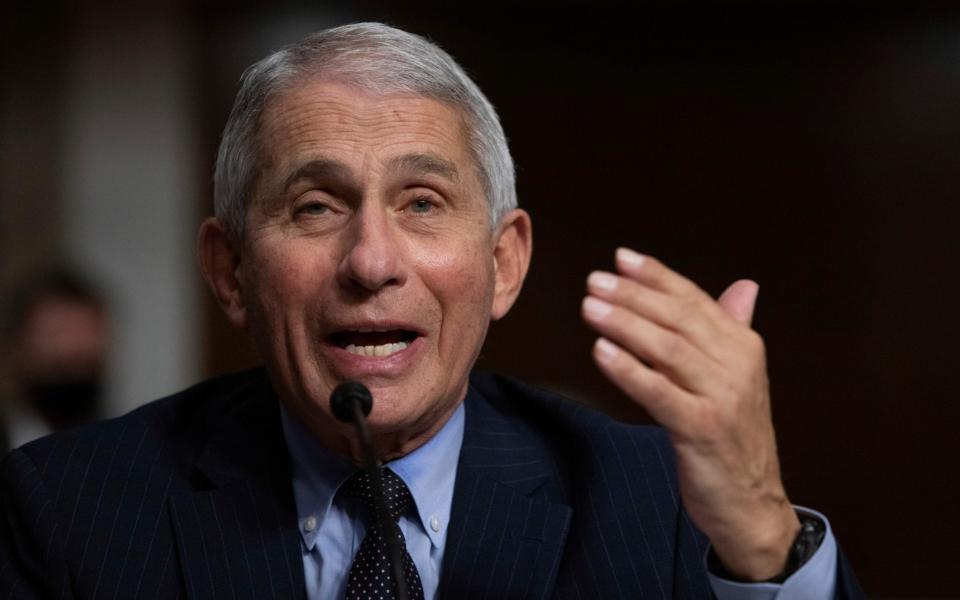Criticism of UK's vaccine approval is because other regulators are playing catch-up, Jonathan Van Tam says

- Oops!Something went wrong.Please try again later.
Claims that Britain moved too fast to authorise the coronavirus vaccine are an attempt by other regulators to deflect from their own shortcomings, England’s deputy chief medical officer has said.
After America’s top medical advisor joined the European Medicines Agency in questioning the UK’s success, Professor Jonathan Van Tam suggested they were trying to make excuses for being “further behind."
He argued that the UK had become the first country in the Western world to grant authorisation because it was “really, really organised”, adding that he had personally been preparing for a vaccine since the first lockdown in March.
Meanwhile, the Education Secretary Gavin Williamson was accused by one of the Government’s own scientific advisers of promoting “vaccine nationalism” after claiming the UK had eclipsed France, Belgium and the US because it was a “better country”.
Confirming approval of the vaccine on Wednesday, Dr June Raine, the chief executive of the MHRA, said the regulator had been able to act quicker due to the use of a “rolling review”.
This is a process where data is studied while trials are still ongoing rather than in one release when they conclude, meaning a vaccine candidate can be fast-tracked without the need to “cut corners.”
However, in an incendiary statement, the EMA claimed that its longer approval procedure was more appropriate while
Wading into the row on Thursday, Dr Anthony Fauci, the top infectious disease expert in the US, also claimed that the UK regulators were too quick to authorise the Pfizer-BioNTech vaccine, though he later apologised for his comments.

“The way the FDA is, our FDA is doing it, is the correct way,” he told Fox News.
“We really scrutinise the data very carefully to guarantee to the American public that this is a safe and efficacious vaccine.
“We have the gold standard of a regulatory approach with the FDA. The UK did not do it as carefully and they got a couple of days ahead. I don't think that makes much difference. We'll be there. We'll be there very soon.”
The US is unlikely to issue approval until December 10.
In a later interview with BBC News, Dr Fauci said he did not mean to "imply any sloppiness", adding: "I do have great faith in both the scientific community and the regulatory community at the UK."
Hitting back at the claims, Prof Van-Tam said that a number of other regulators were “close behind” and were also likely to approve the vaccine in a “matter of days”.
“If you are a regulator that is slightly further behind, what do you say to justify your position that you are further behind. Words such as the ones you have heard, perhaps,” he told BBC Breakfast.
"I think this will all be solved in a matter of days, in the sense that I think other regulators are very close behind.”
Defending the MHRA’s approval process, Prof Van-Tam added that he was “very confident in the assessments” and revealed that he had told his mother, who is 78, she “must have this vaccine”.
Separately, Mr Williamson provoked a backlash among scientific experts after he claimed the UK had got the vaccine first because it was a “much better country” than France, Belgium and the US.
"I just reckon we've got the very best people in this country and we've obviously got the best medical regulator, much better than the French have, much better than the Belgians have, much better than the Americans have," he told LBC Radio.
"That doesn't surprise me at all because we're a much better country than every single one of them."
His comments were echoed by Jacob Rees-Mogg, the Leader of the House of Commons, who told MPs that the approval of the vaccine was a “British success”.
"The UK should be really proud that our regulator got in first and we notice that the European regulator is a bit sniffy about it, wishes we hadn't done it, and that Germany and France and other European countries haven't managed to do the same thing,” he continued.
"We have, we're leading, draw your own conclusions, as I'm sure the British public will. We are now free of the dead hand of the European Union and will be even more free from that on January 1.”
Responding, Jeremy Farrar, a member of the Scientific Advisory Group on Emergencies (Sage) and director of the Wellcome Trust, said that “vaccine nationalism had no place in covid or other public health matters of global influence.”
“Science has always been the exit strategy from this horrendous pandemic - that science has been global and has needed unprecedented global partnerships and global financing,” he said.
Public health interventions,vaccines,diagnostics and treatments are now starting to be available because of those partnerships.
“Every single one comes about by work across borders. Vaccines made possible by science and support of so many. No country could have delivered these vaccines.”
A spokesman for the European Commission said: “We're convinced the UK regulators are very good, but we're definitely not in the game of comparing regulators across countries nor of commenting on claims as to who is better. This is not a football competition. We're talking about the life and health of people.”

